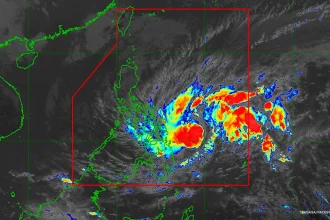
Metro Manila, Philippines – The government surrendered former President Rodrigo Duterte to the International Criminal Court (ICC) as extradition is applicable only to member states, Justice Secretary Boying Remulla said at the Senate on Thursday, April 10.
The Philippines exited the Rome Statute, which created the ICC, in March 2019 upon orders of Duterte himself. Heated exchanges marked the third hearing of the foreign relations committee between the former president’s allies and executive officials.
“Hanggang arrest lang tayo. Bakit mo binyahe? Pwede mo naman i-surrender sa local courts natin, ikulong sa Pasay,” Senator Ronald “Bato” dela Rosa asked Justice Secretary Jesus Crispin “Boying” Remulla.
[Translation: We could have only arrested him. Why did you make him travel? You could have surrendered him to our local courts, detain him in Pasay.]
“Kung miyembro tayo ng ICC makakatulong sana dahil hindi siya ililipad. Eh siya mismo ang nag-atras ng ating membership eh,” Remulla responded.
[Translation: If we were still a member of ICC, it could have helped and we did not need to send him. But it was him who withdrew our membership.]
READ: TIMELINE: ICC probe into the Philippines’ war on drugs
Remulla cited Republic Act 9851 – which penalizes crimes against international humanitarian law, genocide, and other crimes against humanity – on the options of the government to surrender or extradite a person to an appropriate international court conducting an investigation such as the ICC.
He said since the country withdrew from the ICC, an extradition is out of the question and the “best judgement” of the government was to surrender Duterte.
Senator Imee Marcos, the president’s sister and chairperson of the committee, questioned the failure to obtain a warrant from a local court before surrendering the former chief executive to the international tribunal.
Remulla said a certification from the Department of Justice was enough for the ICC to consider the transfer in custody.
However, retired Supreme Court Senior Associate Justice Adolfo Azcuna noted that the lack of a local arrest warrant may be raised as well in the ICC pre-trial chamber hearing set for Sept. 23.
“There was a violation in the act of surrender,” Azcuna said, noting that the Rome Statute, which created the ICC, requires the arrested person to be brought before a local court.
A member of the Constitutional Commission that drafted the 1987 Constitution, Azcuna pointed out that the ICC adheres to the “Male captus bene detentus” principle, which means that “even if the arrest is illegal, the detention can still be legal” based on the gravity of offense.
In the heated exchange, Remulla at one point said the Senate panel was “bullying” executive officials.
“This is what we were expecting. We didn’t want to be bullied into a position. You are trying to make people admit something that we will not admit,” he said.
















